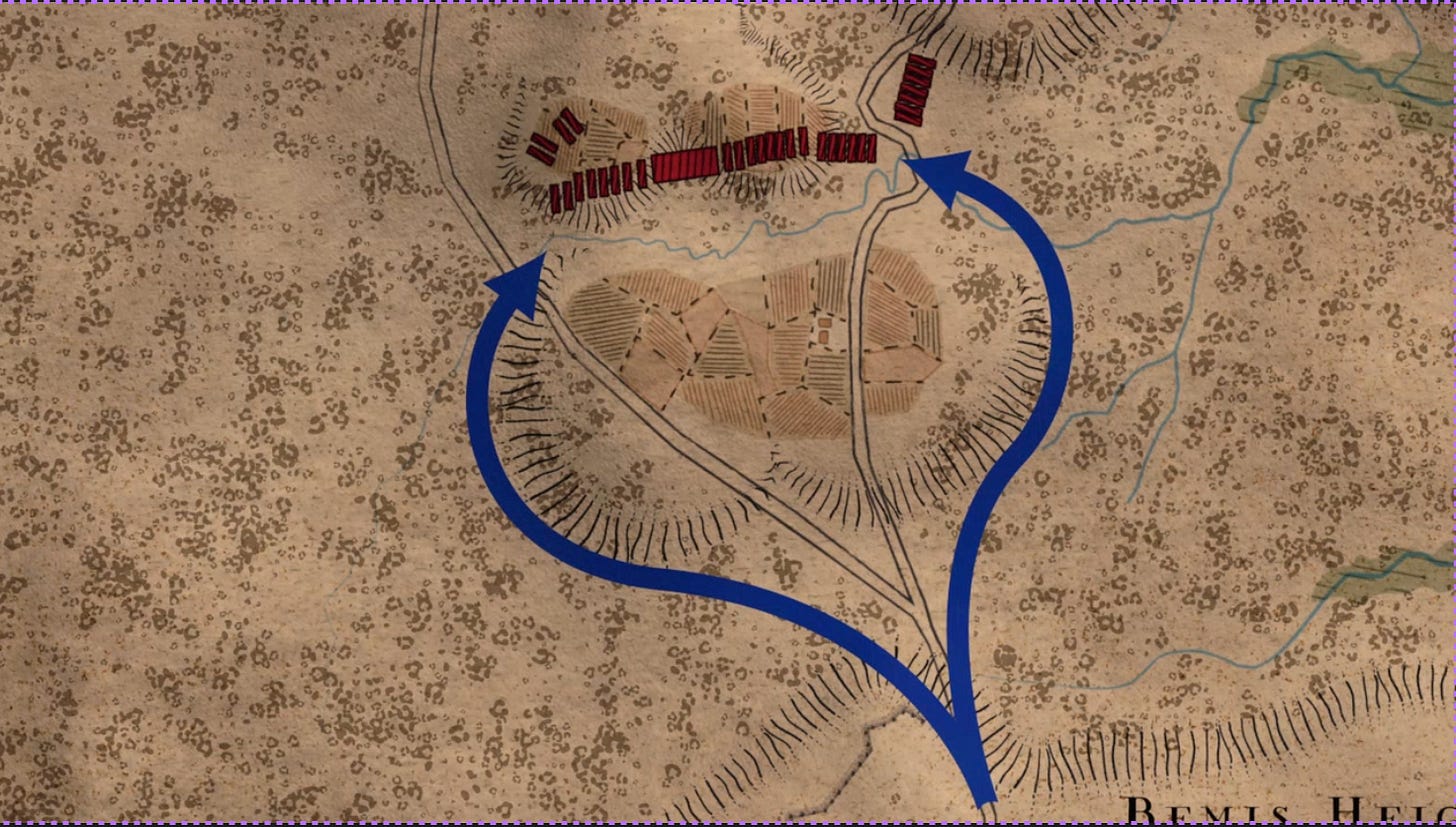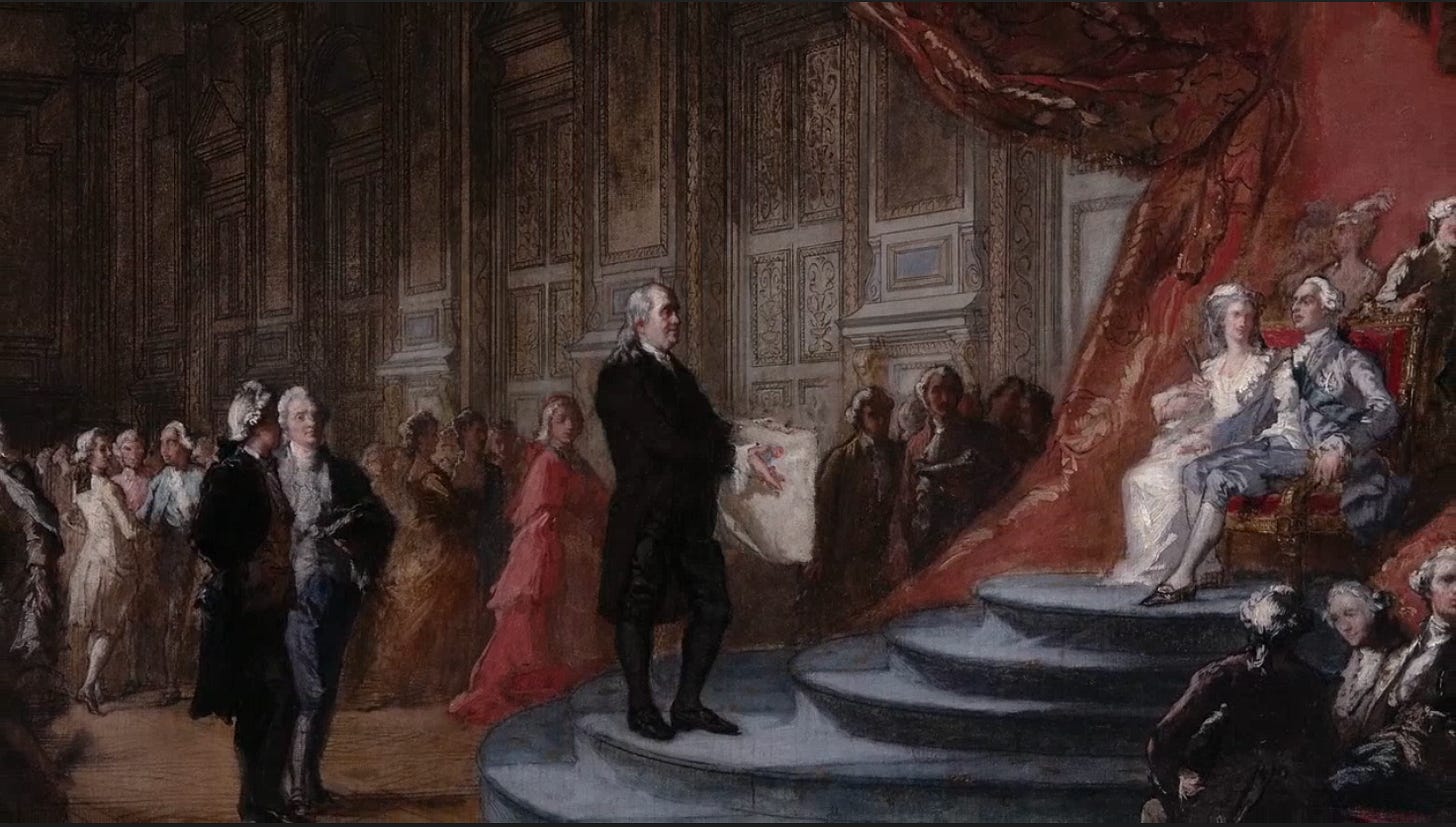Episode 4 of The American Revolution
Indian land as a recruitment bonus + vive la France!
Hi you,
I’m back with a quick reaction to Episode 4 of The American Revolution, Ken Burns’s epic 12-hour biopic? Biodoc? Binge TV series? You can also find my thoughts on episodes 1 through 3.
In this recap here are the highlights
Why an educated public matters in democracy
The unsung dirty work of women
The buildup around Benedict Arnold
Vive la France
Getting the poor to fight the for the rich
On the necessity of an educated public.
Historian Gordon Wood got me with this one:
The revolutionaries believed that the American people would have to be educated. Without education, there could be no virtue in the populace and without virtue in the populace, the government would fail. Republics are are based on authority coming from the bottom up, not like monarchies from the top down. So you require an educated, virtuous — they use that term over and over, drawing it from antiquity — virtuous population to sustain a Republican government.
Women Were Everywhere
I wrote in a previous highlight about the combat role of women. In episode 4, I was moved by this acknowledgement made by historian Kathleen Duval:
Imagine what a battlefield looks like after a battle. It has a lot of bodies. It has a lot of blood and gore, and it was the job of women to go in and take care of those bodies, to clean them up, to identify them if they could, to see over the burial of bodies. Part of the work of war is dealing with death.
Corpses don’t clean themselves up, and I appreciate naming how violent this war was and whose job it was to erase the signs of that violence.
Benedict Arnold is really getting built up. Oh, pincer move!
“ The redcoats crumbled then Benedict Arnold galloped onto the battlefield,” goes the voiceover. The name Benedict Arnold today is synonymous with betrayal. But so far we are just seeing a really effective leader getting troops to do all sorts of things, like try to take over Canada or pull off this pincer move which to be honest I learned about most in Tenet. If you know, you know.
We Owe The French A Lot
Historian Stacy Schiff said the very quiet parts out loud:
The importance of the French Alliance, just in entirely practical terms, we’re talking about what would today be $25 to $30 billion in aid. We’re talking about a war effort that the colonies could not have provided for themselves, and the idea that a foreign power bankrolled that effort and that it would’ve been impossible without them.
That’s the chapter we don’t like to think too much about because our sense of our independence is that it’s something that we achieved on our own.
We Owe Indigenous Americans More
Most of Washington’s new recruits signed on for three years and a $10 bonus. But those who signed up for the duration of the war were promised a $20 bonus and 100 free acres of Indian land when the war was over.
Unlike 40 Acres and a mule, the federal government delivered and sustained its promises of land to veterans of the Revolutionary War. The first Americans, to be clear, did not consent. This is such an important line in the series.
The initial group to found the country and create the Declaration of Independence largely consisted of wealthy, land-owning, and people-owning white men. They wanted more (as I highlighted in the Episode 1 post). When things popped off in Boston, the idea and excitement over the revolution struck a nerve, but to sustain momentum and continue to recruit new fighters, these elite revolutionaries needed to convince poorer Americans to join the fight. They did so, in part, with a promise of land.
As the voiceover lays out:
from 1777 onward, the American Revolution, begun in part to defend the interests of property owners, would be fought mostly by men who owned little or no property at all.
But that’s pretty much every war ever, right? Honestly, it reminds me of ICE recruitment efforts today: a signing bonus of tens of thousands of dollars and forgiveness of student loan debt in some cases. Whatever it takes to get the poor to take on the battles of the rich will be pursued and offered. In this case that offer was land that the founders had no right to offer.
In case you haven’t seen the Immigration and Customs Enforcement recruitment language:
One more thing
Mohawk Joseph Brant
This episode features lengthy explanations about the split in the Haudenosaunee Confederacy between British and American allegiance across the Six Nations, and in particular among the Mohawk, the easternmost nation of the confederacy.
I watched with anticipation to see where the story would go as I’ve come to learn some of its details from Mohawk elders in recent years. So far, at least, Burns and team have only told half the story and focused entirely on Joseph Brant who sided with the British.
I’ll reserve complete judgment until the series ends to see if they balance this with the other side of that split and tell the story of the Mohawks who sided with George Washington and the new Americans.
There’s one character in particular, Lt. Col. Louie Cook, who I’m watching for. He was the highest ranking indigenous officer in the Continental Army. He was also the highest ranking Black officer in the Continental Army. Because he was both. An Afro-Indigenous man who reported to Washington and was critical in many battles. His life and story are the embodiment of what it took to create this nation. I’ll share more later.
That’s the teaser for now.
As usual, let me know what you’re seeing and not seeing in this series.





Whatever it takes to get the poor to take on the battles of the rich will be pursued and offered - wow, how can we unpack that…over 250 years…
I can see that being applied to every war we’ve ever fought.
Baratunde, you highlight all my highlights! All these parts of the episode hit me - especially the one about the bodies on the battlefield.
This series proves that old dogs can learn....if not new tricks, at least new history! I'm an 82-year-old white widow from Illinois but now choosing to live in New Mexico, and I'm eating up this American Revolution series with a ladle, not just a big spoon. After watching the first 5 episodes, with only the closing one remaining. my main impression is "how on earth did this country ever get off the ground?" And, along with that, our origin is not much to be proud of. (Which I ready knew, but it's much worse than I'd imagined!) Conversely, the stamina, the determination, the grit, the faith, the vision that so many people maintained and persevered with is beyond amazing.
I've been pleased that so much has been presented of how the Iroquois Confederation helped in serving as a role model for democracy. But the cavalier manner in which the white European "Americans" assumed in giving away the native lands is only what's happened everywhere. (I've been reading Jared Diamond's "Guns, Germs & Steel." which analyses the forces that promote or discourage change in culture, foods, customs, and "whose ox is being gored" this time. Climate, weather, topography...all things humans have no control over are, often, a bigger influence on who wins and who loses some crucial contest than the people themselves. (That, in fact, is brought out in this series with the emphasis on weather and climate, storms at sea, and extreme temperatures in both summer and winter.)
Sorry to ramble on so, but thanks for providing the opportunity to do so.